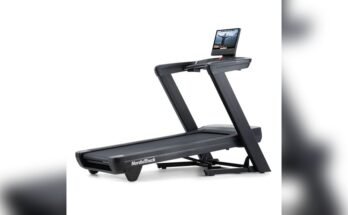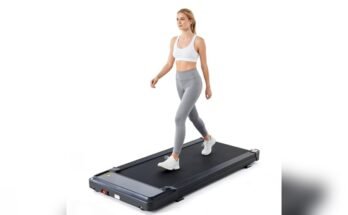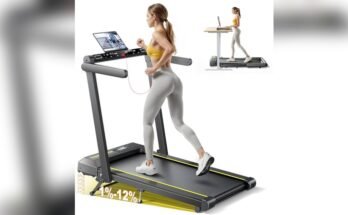The ideal time to eat in relation to using a treadmill depends on your fitness goals and how your body feels during exercise. Eating before a treadmill workout can provide energy, whereas eating after can aid recovery.
Embarking on a treadmill workout presents the question of whether to fuel up beforehand or to indulge in post-exercise nourishment. Determining the best approach necessitates understanding how your body processes food and how that impacts your workout performance. For those aiming to increase endurance and performance, a light snack about 30 minutes before hitting the treadmill may provide the necessary energy without causing discomfort.
On the flip side, for weight loss or those prone to digestive issues, waiting until after the workout to eat might be advisable, as it can prevent any digestive distress and capitalize on the body’s fat-burning state post-exercise. Remember that staying hydrated is crucial, regardless of your eating schedule, to ensure optimal performance and recovery.

Credit: www.abbott.com
Fueling Up Vs. Fasting: The Pre-workout Debate
What’s the best way to prep for treadmill time? It’s a hot topic. Should you grab a snack or skip it? Experts have weighed in, and science offers insights. Find out whether you should be fueling up or hitting the treadmill on an empty stomach.
The Science Behind Eating Pre-workout
Eating before a workout can boost your performance. Here’s a simple breakdown:
- Carbs give you energy.
- Proteins help your muscles.
- Fats fuel longer exercises.
Studies show that glucose from carbs improves exercise. It fuels your brain and muscles. Without it, you might feel weak and unfocused.
| Time Before Exercise | Type of Snack | Benefits |
|---|---|---|
| 3-4 hours | Full meal with carbs, proteins, and fats | Maximizes energy and muscle support |
| 30-60 minutes | Small snack, mostly carbs | Boosts blood sugar for immediate energy |
Benefits Of Exercising On An Empty Stomach
Fasting before exercise can tap into fat stores. When you don’t eat, your body uses fat for energy. This might help with weight loss.
On an empty stomach, fat oxidation increases. You might burn more fat. It’s called ‘fasted cardio’ and can be effective for weight management.
- Your insulin is low.
- Your body switches to burning fat.
- You may improve your metabolic adaptability.
Breaking Down Energy Sources: Carbs, Fats, And Protein
Understanding how our body uses energy during treadmill workouts guides us in choosing the best time to eat. Carbs, fats, and proteins serve as fuel but in distinct ways. A smart approach to meal timing can lead to better performance and recovery.
How Different Nutrients Fuel Your Treadmill Sessions
Carbs are the main energy source for high-intensity treadmill sessions. Your body converts them into glucose, providing quick energy. Fats fuel longer, moderate exercises by releasing energy slowly. Proteins, though not a primary energy source, aid muscle repair post-workout.
- Carbohydrates: Best for quick energy needs.
- Fats: Ideal for sustained energy.
- Proteins: Essential for muscle recovery.
Timing Your Meals For Optimum Performance
A pre-workout meal should include carbs and some protein. This meal fuels your body and aids muscle endurance. Aim to eat this 1-3 hours before your workout. Post-workout, focus on proteins and some carbs to aid recovery. A 30-minute window post-exercise is ideal for this meal.
| Meal Timing | Nutrients Focus | Performance Benefits |
|---|---|---|
| 1-3 hours before | Carbs + Protein | Energy & Endurance |
| Within 30 minutes after | Protein + Carbs | Recovery & Muscle Repair |
Listen to your body’s cues and adjust meal timing and composition to fit your specific energy needs for treadmill workouts. Eating at the right time with the right nutrients can significantly enhance your performance and recovery.
Post-workout Nutrition: The Key To Recovery
Imagine finishing a vigorous treadmill session. Your body is tired, but it’s ready for recovery. Nailing your post-workout nutrition is vital. It can mean the difference between a speedy recovery and prolonged fatigue.
The Importance Of Protein And Carbs After Exercise
Protein rebuilds muscles. Carbs replenish energy stores. Together, they’re the dynamic duo of post-workout nutrition.
- Protein helps repair muscle fibers, aiding in muscle growth.
- Carbohydrates refill glycogen, your energy reserve.
Eating the right balance promotes efficient recovery. Without it, your next exercise might suffer.
Refueling After Intense Cardio: What To Eat
Finished an intense run? It’s time to refuel. Choose snacks that are rich in protein and carbs.
| Food | Type |
|---|---|
| Smoothie with protein powder | Protein + Carbs |
| Whole-grain turkey sandwich | Protein + Carbs |
| Yogurt with fruit | Protein + Carbs |
Opt for easy to digest foods so your body can quickly use the nutrients. This supports faster recovery.

Credit: www.facebook.com
The Influence Of Personal Goals: Weight Loss Vs. Muscle Gain
The decision to eat before or after hitting the treadmill can shape your fitness journey. Your choice hinges on whether you’re chasing weight loss or aiming to bulk up with muscle gain. To maximize treadmill workouts, align your nutrition with your fitness ambitions.
Eating Strategies For Burning Fat
Working out on an empty stomach may ignite fat burn. The body taps into fat stores for energy when it lacks readily available glucose. Consider a light, protein-rich snack if training fasted feels too challenging.
- A small portion of almonds could offer sustained energy without heavy digestion.
- A protein shake keeps muscles fed and hunger at bay.
- Drink plenty of water to stay hydrated.
Nutrition Tips For Building Muscle
Muscle gains require fuel. Eating carbs and protein pre-workout provides the necessary energy and building blocks for muscle synthesis.
| Food Type | Benefits |
|---|---|
| Whole Grains | Long-lasting energy |
| Lean Proteins | Muscle repair and growth |
| Bananas | Quick energy and potassium |
Post-treadmill, focus on protein intake to repair and grow muscles. A balanced meal within two hours ensures muscles receive the nutrients needed.
Myths Vs. Facts: Debunking Common Treadmill Nutrition Advice
Exercise routines and nutritional advice often come bundled with myths. It’s vital to know whether it’s best to eat before or after hitting the treadmill. This section delves into familiar treadmill nutrition myths and lays out the facts to ensure an informed and effective workout plan.
Mythbusting: Do You Really Burn More Fat Fasting?
Fasting before workouts, dubbed “fasted cardio,” claims to improve fat burn. Many believe that exercising on an empty stomach forces the body to use fat for fuel instead of carbs from a recent meal. But scientific evidence indicates that total fat loss comes from a consistent caloric deficit rather than whether you eat before a run.
- The body burns fat based on overall daily activity, not just workout timing.
- Eating before exercising fuels your body, potentially leading to a more intense and productive session.
- Working out fasted can increase muscle breakdown if the body lacks enough energy.
Separating Fact From Fiction In Meal Timing
Meal timing around treadmill workouts evokes various suggestions, often confusing. Guidelines for consuming the right balance of nutrients depend on individual goals and body responses.
| Meal Timing | Benefits | Best Practices |
|---|---|---|
| Pre-Workout Meal | Provides sustained energy, reduces muscle glycogen depletion, prevents hunger | Eat a mix of carbs and protein 1-3 hours before exercising |
| Post-Workout Meal | Supports muscle recovery, replenishes energy stores | Consume within 45 minutes after exercising for optimal recovery |
Eating too close to a workout may cause discomfort while waiting too long afterwards might slow recovery. Listen to your body and consider personal comfort and energy levels when deciding meal timing around treadmill sessions.

Credit: food.makaratobago.com
Listening To Your Body: Tuning Into Hunger And Energy Levels
Deciding whether to eat before or after using a treadmill can puzzle many fitness enthusiasts. Listening to your body’s hunger and energy signals is the key to optimizing your workouts. Does your stomach growl, or do you feel sluggish before a jog? The answers to these questions can guide your eating choices.
Assessing Your Personal Energy Needs
Finding the right balance for your exercise routine begins with assessing your energy needs. Everyone’s body is unique. Some may require a light snack while others perform better fasted. Keep a food and workout diary, noting your energy levels during different scenarios.
- Morning sessions may need a different approach than evening workouts.
- Intensity and duration influence energy needs greatly.
- Stay alert to signs of fatigue or weakness.
Learning To Adapt Your Nutrition To Your Workout Schedule
Adapting meal timing to your workout schedule is essential. Create a nutrition plan that syncs with your exercise for optimal performance. Adjusting your meal size and composition around your treadmill sessions helps maintain energy without discomfort.
| Meal Time | Fitness Activity | Recommended Action |
|---|---|---|
| 2-3 Hours Before | Endurance Training | Complete meal with carbs, protein, and fats |
| 30-60 Minutes Before | Light Jog | Small snack, easily digestible carbs |
| After | High-Intensity Interval Training | Protein-rich recovery meal |
Experiment with different food types and timing to discover what fuels your body best. Start with easy-to-digest foods if you decide to eat beforehand. Post-workout, focus on recovery nutrition. Observe how your body responds to these changes to find your perfect routine.
Frequently Asked Questions Of Is It Better To Eat Before Or After Treadmill?
Does Eating Before Treadmill Enhance Performance?
Eating a small, easily digestible meal or snack before a treadmill workout can provide energy and improve performance. However, it’s crucial to allow time for digestion to avoid discomfort.
Can Working Out On An Empty Stomach Burn More Fat?
Exercising on an empty stomach may increase fat oxidation, as the body taps into fat stores for fuel. However, this does not necessarily translate to greater overall fat loss, and energy levels might be lower.
What Should I Eat After A Treadmill Workout?
Post-workout, focus on a mix of proteins and carbohydrates to aid in muscle recovery and replenish glycogen stores. Examples include a protein shake with banana or a chicken sandwich with veggies.
How Long Should I Wait To Eat After Using A Treadmill?
It’s recommended to eat within 45 minutes after exercising to optimize recovery. This helps repair muscles and restore energy levels efficiently.
Conclusion
Deciding whether to eat before or after using the treadmill depends on your personal goals and body’s response. Pre-run snacks can fuel longer sessions, while post-run meals may aid recovery. Listen to your body’s cues and consider a nutritionist’s advice for tailored guidance.
Balance and moderation key to maximizing treadmill workouts.


